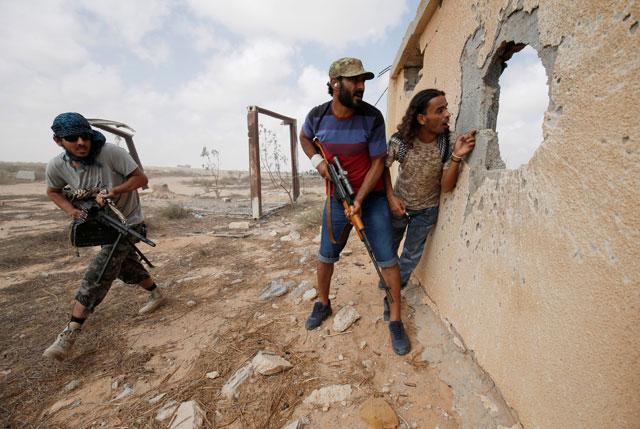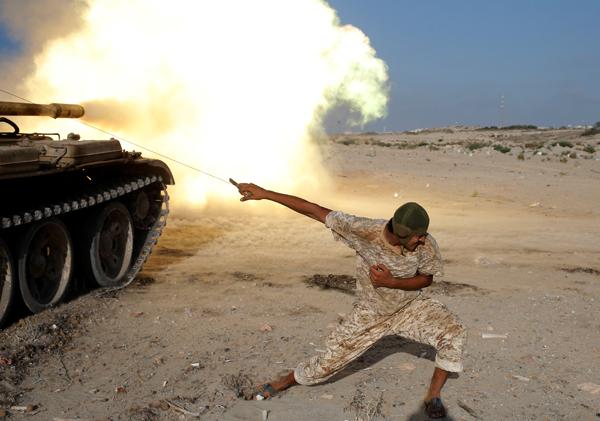You are here
US air strikes show limits on Libya intervention
By Reuters - Aug 08,2016 - Last updated at Aug 08,2016

Libyan forces allied with the UN-backed government take cover during a battle with Daesh terror group in Sirte, Libya, July 15 (Reuters photo)
TUNIS — While US jets and drones are pounding the Daesh terror group in the Libyan city of Sirte, Western powers are unlikely to expand their military involvement rapidly, anxious to avoid exacerbating factional divisions as the government they support struggles to establish itself.
The United Nations-backed government asked for the US air strikes which began on August 1, but it has still not made a long-awaited request for broader security help — including a possible easing of an international arms embargo on the factions which emerged during and after the 2011 overthrow of Muammar Qadhafi.
"They know that the international community is ready to help with training and advice, but specific requests are not emerging yet," said a Western diplomatic source.
Forces aligned to the Government of National Accord (GNA), which set up in Tripoli four months ago, have battled for weeks to remove Daesh militants from Sirte, the extremist group's former North African stronghold.
Now US "Operation Odyssey Lightning" is targeting tanks, armed pick-up trucks and fighting positions in the slowly shrinking area of Sirte that Daesh still holds, easing the passage for Libyan ground forces.
However, the GNA has moved slowly to formulate its own security strategy and seek more foreign help, handicapped by internal political splits, a lack of capacity, and sensitivity to criticism that it is dependent on external support, Libyan and Western officials say.
Discussion of a 5,000-strong Italian-led peacekeeping mission has fizzled out, and foreign ground intervention has been limited to small-scale special forces deployments.
Coastguard training is being planned, but programmes to train and equip national security and police forces have yet to be developed.
One request that is expected sooner or later is for exemptions to the UN arms embargo. World powers said in May they were ready to consider this to help the GNA combat Daesh, but much depends on its ability to show that arms will not end up in the wrong hands, from a Western point of view.
Among the likely recipients would be fighters from the city of Misrata, which lies roughly midway between Tripoli and Sirte.
They have backed the GNA, providing security in Tripoli and leading the battle against Daesh in Sirte, Qadhafi’s home town.
However, the loyalty of Libya’s armed factions has been fickle in the past and the GNA’s leadership, or presidential council, has yet to form a unified military command structure.
“Only regular units under the command of the presidential council will get an exemption from the arms embargo,” UN Libya Envoy Martin Kobler told Reuters.
“The presidential council has to be accepted as the supreme commander of the army. The question is does it really have control over the Misrata forces? Maybe yes, maybe no.”
Loud rejection
The Misrata brigades say they will return home after securing Sirte from Daesh.
However, some people see a risk of renewed conflict between loose alliances of armed groups that fought for control of Tripoli in 2014. The fear is that the Misrata brigades will end up fighting forces loyal to Khalifa Haftar, a military commander based in eastern Libya.
Haftar and his allies have so far loudly rejected the GNA, and foreign powers intervening anywhere in Libya risk being seen to take sides among the local factions.
“The challenge for the West will always be to surgically fight ISIS [Daesh] whenever that implies not getting dragged into Libya’s civil war,” said Mattia Toaldo, a Libya expert at the European Council on Foreign Relations.
The limited foreign involvement so far has met with a mixed reception locally. While the United States and Britain are popular around Misrata, France is out of favour there.
French special forces have been operating for months in the eastern city of Benghazi, where fighters loyal to Haftar have been battling opponents including Daesh.
After three French soldiers were killed last month in a helicopter crash south of Benghazi, confirming their presence, there were protests in Misrata and Tripoli, and the GNA summoned the French ambassador.
However, the US strikes against Daesh — both in Sirte and in the western city of Sabratha in February — have provoked few protests.
Libyan militants returning from fighting in the Syrian civil war helped to implant Daesh in the country in 2014, but the group has struggled to win support or hold territory, with most local people regarding it as a malign import dependent on foreign fighters.
The GNA-backed forces wonder why the US strikes did not come sooner. “We just want this fight to end, we’ll take any help we can get,” said one commander on the Sirte front line.
But that openness does not extend to the idea of foreign boots on the ground, or broader efforts to end the security vacuum that allowed Daesh to gain a foothold.
“The need for outside help with training is certainly recognised at senior political level,” the diplomat said. But in discussions about a peacekeeping force, the Libyan position was very clear — nothing like the “Green Zone”, the secure international area of Baghdad, would be acceptable.
Even for training, “any visible presence on the streets would be difficult”, said the diplomat.
Related Articles
SIRTE — When Western officials cajoled Libya’s warring factions to support a unity government this year, they said it was a chance for the r
TRIPOLI — The United States has opened a new front in its campaign against the Daesh terror group, launching air strikes to support Libyan f
TRIPOLI — Escalating tensions between rival Libyan armed forces threaten to plunge the North African country deeper into turmoil only weeks













